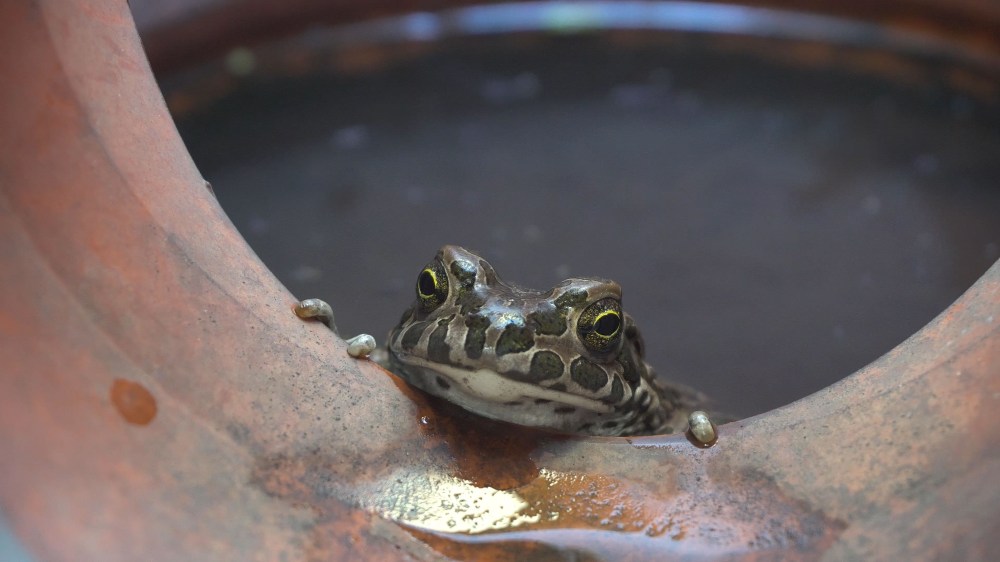Election Day is finally here. Join us Tuesday for a special, three-hour election night livestream and let The Dispatch be your guide through all the chaos that is sure to come. Usually, Dispatch Live is exclusively for Dispatch members—but we’re making this special episode available to all our readers, so feel free to invite your friends and family!
We’ve put together a stacked lineup for the night—including Megan McArdle, Stephanie Slade, David Frum, and Sharon McMahon. They’ll join your favorite Dispatchers to track the state-by-state updates, break down the results, and keep calm through the uncertainty. It’s a night you don’t want to miss.
See you Tuesday night at 10 p.m. ET!
Last week, New York Times columnist Michelle Goldberg compared waiting for the election returns to waiting for the results of a biopsy. It’s a fine metaphor, vivid in capturing the dread of this moment, but it’s inapt.
We’re not waiting for a diagnosis, we’re waiting for a prognosis. We know there’s a malignancy. What we don’t know is how bad it’ll get.
If Donald Trump wins, Americans will find out the hard way how abusive a term-limited authoritarian egged on by yes-men and emboldened by criminal impunity in wielding his core powers might be. We’ll also learn how far the salt-of-the-earth patriots of the American right—most of whom are supposedly voting for nothing more malicious than lower grocery prices and a stronger border—are willing to go to rationalize that abuse.
My suspicion in both cases is: Further than we think.
If Trump loses, on the other hand, Americans are assured of a coup attempt. If you’re reading this on Tuesday evening, it might already be in motion.
The one and only certainty in this election is that Trump will declare victory on Election Night, whether or not the results support that. His opponent expects it, as do most voters. They know the man; they recall how he reacted to losing the last time; they’ve heard, presumably, that he’s already begun bleating about fraud in states like Pennsylvania in case things don’t go his way.
One might assume that his supporters would be harder to dupe with claims of cheating in 2024, having been sold that bill of goods once before, but I think the task will be easier this time than last. Trump is polling much better than he was four years ago, when he nearly pulled a momentous upset, and right-wing propagandists have capitalized on that to reassure Republicans that the race is in the bag—if the votes are counted fairly.
For many Trump voters, a second defeat will come as a true shock, inexplicable except through ulterior means, which is just how their hero and his cronies want it. Those voters will react badly.
Republicans in office will react badly too. A second “rigged” election following an additional four years of radicalization on the right, from top to bottom, will lead some who resisted the coup plot of 2020 to join the coup plot of 2024. Trump will demand that they do everything possible to overturn the results, knowing that prison awaits him if they fail. How Congress will proceed on January 6 if the GOP controls the House and Senate, with the right-wing base in revolt, is as unclear as the outcome in Pennsylvania 24 hours from now.
One way or another, then, the country is doomed to suffer a wrenching crisis. It will happen immediately if Trump loses or in the longer run if he wins, but it will happen. No matter the outcome, the pre-election daily dread Michelle Goldberg described will be followed by months of daily dread as January 6 approaches or years of daily dread as Trump’s presidency plays out.
My Election Day thought for you is this: We deserve every bit of it. The frogs have boiled.
Just deserts.
I’ve written before about Kevin Williamson’s warning to National Review readers on the day Trump locked down his party’s nomination in 2016. “Americans and Republicans, remember: You asked for this,” he said. “Given the choice between a dozen solid conservatives and one Clinton-supporting con artist and game-show host, you chose the con artist. You chose him freely. Nobody made you do it.”
Kevin meant that as an admonishment but I’m offering it as a consolation. Doesn’t it make you feel a little better to realize that we asked for this?
Everyone knows the misery of learning that misfortune has befallen an innocent acquaintance. A neighbor’s child is diagnosed with cancer; a friend’s spouse dies in an accident. You could tear your hair out in anguish when you hear of it. The grief is one thing, but the injustice of it is unbearable. Bad things happening to good people will shake your faith in the moral order of the universe.
But bad things happening to people who make immoral choices? There’s always some satisfaction in that. You might feel a twinge of compassion for a bank robber who’s shot during a heist or for a wife-beater who’s roughed up in prison, but there’s no sense of moral outrage. The order of the universe is affirmed: If you behave maliciously, you will—and should—suffer. And your suffering will be a lesson to others not to follow the path you chose.
We’ve made an immoral choice by delivering Donald Trump to the brink of victory. What kind of universe would this be if we didn’t pay for it?
The singular fact of this campaign is that, for the first time in his three runs for president, we have hard proof of how dangerous he’s capable of being as president. In 2016 and 2020, his authoritarian pretensions were mostly the stuff of Never Trump speculation; then, day by day for two months after he lost to Joe Biden, he went about proving that we’d actually underestimated him. He’s now a convicted criminal with dozens of felony charges still pending against him. And he makes no bones about his intentions in a second term, talking openly about “retribution” against “the enemy from within” and promising supporters that his next administration will be “nasty.”
You don’t need to write a newsletter for The Dispatch to predict that he’ll try to overturn this election if he loses or will misuse his powers as president to persecute his opponents if he wins. You need only to have been alive since November 2020 and had access to a television set.
Yet despite the fact that we all know he’ll put the country through hell, win or lose, he’s polling better than he ever has and is viewed more favorably than he’s ever been. Republicans could have dispensed with him after January 6 or in this year’s presidential primary, and general election voters could have handed Kamala Harris a polling lead sizable enough that even Trump fans would have trouble believing the inevitable claims of cheating after a defeat. They didn’t.
Every opportunity to mitigate the damage he continues to cause has been squandered. We chose this disaster, knowingly and deliberately.
Sustaining the political leadership of a man who’s been described as a fascist by even his most eminent former advisers is the most despicable abdication of civic duty by the electorate in the history of the United States. We’ve chosen unfit presidents before, and a few sinister ones, and once chose a man whose victory forced Americans to question their basic moral compatibility—the right choice under the circumstances. Never have we been this close to choosing someone who meets all three criteria, though. With malice toward all, with charity for none: That’s what we’re on the brink of electing.
The name of this newsletter comes from the old saw about how frogs supposedly react to heat. If you drop a frog into a pot of boiling water it’ll hop right out, the theory goes, but if you drop it into a pot of lukewarm water and gradually turn up the flame it’ll acclimate incrementally and boil to death. It’s not true, incidentally, but as a metaphor for desensitization it’s irresistible. I don’t know what other conclusion to reach about Americans on the eve of this election than that tens of millions of frogs who’ve been stewing in Trump’s sludge since 2015 have finally boiled.
And they’re not going to hop out of the pot in a second term, no matter how hot it gets. The political significance of Trump battling Kamala Harris to a dead heat is that half the country has now committed itself to the proposition that a squalid, menacing, incoherent caudillo selling magic beans is a more responsible choice to govern America than any Democrat. Anyone who’s sufficiently far gone to believe that is also too far gone to experience buyer’s remorse when, not if, Trump executes his next coup attempt or behaves corruptly as president.
In fact, unlike in 2016, you rarely hear members of the American right scoff anymore when doomsayers like me predict civic catastrophe if Trump takes office. How could they? They were watching TV on January 6 like everyone else. They know the risk of calamity is real; they’ve either embraced it, as the more feral populists have, or they’ve made peace with it as an acceptable trade-off for lower taxes or more Border Patrol or granting Israel a slightly freer hand or whatever. Trump’s partnership with the right will now truly have no limits, for either side of the bargain.
If, in spite of all that, you want to believe there’s some moral red line he might approach in a second term that his voters won’t permit him to cross, I’d ask you this: Who will be policing that line, supposedly? There’s hardly any resistance left to Trump and Trumpism among right-wing institutions, including and especially among right-wing media. Even within Bill Buckley’s magazine, one of America’s most thoughtful platforms for conservatism and historically the scourge of the John Birch Society, I struggle to think of more than one or two writers (God bless Jay Nordlinger) who plainly prefer to see Trump’s freakishly Bircherite campaign defeated tomorrow.
Nearly all the frogs on the right have boiled and maybe just enough in the center for him to win. Anyone who can rationalize supporting him after January 6 can and will rationalize whatever he stoops to next. As you and I suffer through it, let’s resolve to accept no excuses later from those who support him for the perfectly foreseeable results of the immoral choice they’ve made.
The past and the future.
That’s the best I can do for a consoling thought on Election Day eve—we deserve what we get now. And I do mean “we.” I deserve it too.
I’ve worked in right-wing media for a long time. Even in the early days, people who read me would have told you I was nine parts RINO to one part populist. But that’s still one part too many.
I regret, and will always regret, that I didn’t recognize until very late what the conservative movement was becoming. I plead stupidity, not malice: Not until Trumpmania exploded in 2015 did it dawn on me that adherents of populist conservatism were happy to jettison the conservatism so long as the populist demagoguery got turned up to 10.
Whatever minuscule contribution I may have made toward us arriving at this moment, I’m sorry for it. All I can do to atone is make another minuscule contribution toward trying to lead us away and accept that, whatever Trump has planned, I’m part of the “we” that has it coming.
As for the future, a few foolishly optimistic Never Trump types have told me they believe a Trump defeat on Tuesday might be the end politically not just for him but for Trumpist populism writ large. I’m skeptical.
For Trump, it really might be the end. He’ll want to run again in 2028, if only to preserve the monarchy he’s built atop the GOP, but he’ll be 82 and he’s already slowing down. And the end of Trump probably means the end of the very particular coalition he’s built. Other Republicans who’ve embraced the Bircherite elements of his program but who lack his charisma, celebrity patina, and comic timing have fared terribly down ballot, by and large. Trump is larger than life. Kari Lake and Doug Mastriano are not.
So, no, the Trump coalition isn’t sustainable. But it’s easy to imagine Republicans processing another narrow defeat this week by convincing themselves that the problem, ultimately, was the messenger rather than the message and that a new, bigger coalition can be built by carrying Trumpism forward.
A couple fewer jokes about Puerto Rico in the home stretch and another year or two of distance from the Dobbs decision that overturned Roe v. Wade, and who knows? Maybe Trump wins this race after all. The seminal lesson of this election will be that proto-fascism is not per se disqualifying in a right-wing candidate; many voters who don’t support it in principle will at least overlook it in the name of electing a candidate whom they prefer to the alternative on immigration or inflation or what have you. Authoritarianism is just another policy issue to be weighed against all the others, it seems.
In that sense, this election will almost certainly be a disastrous defeat for classical liberals and a triumph for postliberals regardless of the outcome. Unless Kamala Harris wins by a landslide, there will be no way to claim credibly that the electorate repudiated Trump’s brand of politics. And no one foresees a Harris landslide. (Well, almost no one.)
The future of the right following a defeat on Tuesday, then, will probably be an argument over which Trumpist postliberal is best positioned to grow Trump’s coalition, not whether postliberalism itself is an electoral dead end. It obviously isn’t.
Some will favor J.D. Vance or Ron DeSantis as nominee in 2028, believing that a brainy wonk who doesn’t scare the horses with violent fantasies about his enemies is the secret sauce. Nominate one of them and suburbanites who’ve been shifting left will come scrambling back to the GOP, more than offsetting the losses among diehard Trumpists who won’t turn out for a pale imitation of their hero.
Others will counter that Trump’s populist movement requires a celebrity figurehead with media chops, charisma to burn, and an appetite for scandalizing the ruling class. Low-propensity voters like the spectacle of culture war by way of pro wrestling that politics became during the Trump era. Only a demagogue more talented than Vance or DeSantis will be able to re-create that for them—and if that demagogue is smarter than Trump, his facility in discussing policy might reassure suburbanites just enough for some to take a chance on him. Guess which potential nominee this bloc will prefer.
You can have your authoritarianism gonzo and provocative or you can have it soft-spoken, quasi-respectable, and “cerebral,” but authoritarianism is what’s on the menu for Republicans in 2028. Frogs do not un-boil. Conservatives should understand that and plot their political futures accordingly, with dignity, instead of humiliating themselves with dreck like this to show that they’re still team players on a team that no longer exists.
If nothing else good comes from Tuesday night, let that awareness come from it, at least. There is no meaningful constituency left for classical liberals on the American right. Something like 95 percent of self-identified Republicans will vote for a candidate who palpably has no respect for the constitutional order and, of that group, 95 percent will excuse or justify everything he does in a second term that proves it. Don’t be one of them, and don’t ever forgive them for not jumping out of the pot before they boiled.







Please note that we at The Dispatch hold ourselves, our work, and our commenters to a higher standard than other places on the internet. We welcome comments that foster genuine debate or discussion—including comments critical of us or our work—but responses that include ad hominem attacks on fellow Dispatch members or are intended to stoke fear and anger may be moderated.
With your membership, you only have the ability to comment on The Morning Dispatch articles. Consider upgrading to join the conversation everywhere.